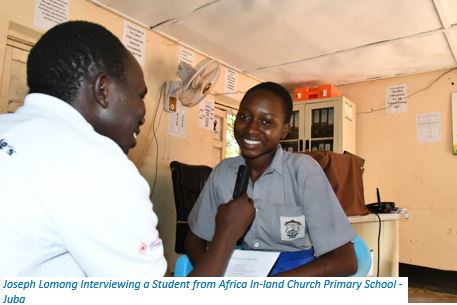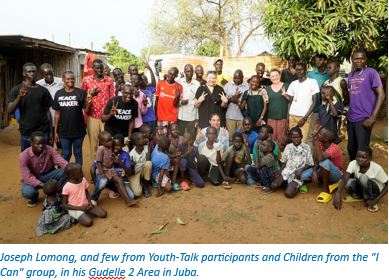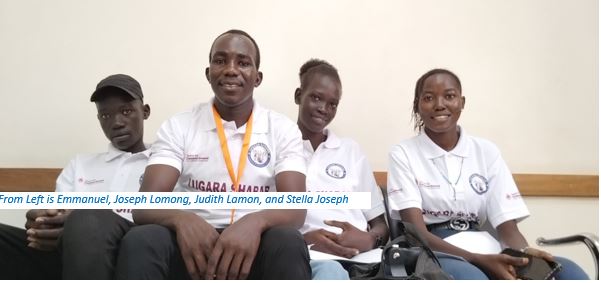After losing both his parents at the age of four, Joseph Lomong was taken in and ‘cared’ for by relatives and this shaped the realities of his life. At just ten years of age, he made a decision no child should have to make; he ran away from home, fleeing domestic violence, mistreatment, and exploitation from the very people meant to care for him.
“I did not exactly pack my bags because there was none apart from the torn shorts and shirt on my body,” he reminisces. “But I left and ended up on the streets of Kapoeta Centre. It was not glamorous and more like surviving a reality show.”
Life on the streets of Kapoeta was a harsh reality, “we ate leftover food, and death from sickness was normal.”
According to Lomong, street children slept under shop verandahs or sometimes school classrooms without doors and windows at night while always intoxicated. However, luck knocked on Lomong’s door when Pentecostal Missionaries took him in.
“I call them my lifesavers,” he chuckles. “I went from dodging the dangers of the street to sitting in a classroom, which was a weird kind of luxury. The ache for drugs was still active, but my determination was far from an ambition.”
His first taste of hope came when he traveled to Juba for a bible study exchange program. It was his first time traveling for something other than survival. “I went to Juba thinking that maybe I will return a preacher or a guy who knows how to read more than three bible verses,” he says. However, the connections he made there opened a new path, one that ultimately led him back to Juba, this time not for a conference but for a new beginning. Nevertheless, settling in Juba was not easy.
“I thought I was escaping street life but here I was again, stuck with a bunch of kids who made ends meet by washing cars and selling goats,” he remembers. “I was not about that life anymore, but I still did not have a plan, no money, no job, no idea what would come next. But at least I had my dignity and, thankfully, no more drugs.”
Lomong’s turning point came when he was introduced to Orphanage Straight Link in the Gudele Two suburb of Juba. He shared his ambitions with the director, unsure if anyone would take him seriously.
“I walked in and thought here we go, another rejection, but instead, the director listened, really listened, saw potential, and not just another street kid,” he says.
That is when Search for Common Ground came into his life. Lomong joined the Youth-Talk Project in 2021, receiving training in most essential skills, from common ground approach and basic journalism to psychosocial support.
“I started as an awkward teenager who could barely speak up,” he says while laughing. “Now I am producing radio shows, leading dialogues, and teaching others. Who knew?”

The Youth-Talk Project gave him practical skills and helped him regain his confidence. “I used to be the quiet one in the room,” Lomong recalls. “Now, I am running talk shows like Lugara Shabab (Youth Drums) and engaging with diverse people, the young, old, experts, political leaders, and academics. It is like I found my voice between the radio static and the studio mic.”
It was however not just about radio and journalism. The real magic was how Search for Common Ground gave him a sense of purpose. “Being part of Search made me realize something huge,” he explains. “We all have a responsibility to make the world better. Whether you are a kid from the streets or someone with a PhD, we are all equal in creating change, particularly in South Sudan.”
The Youth-Talk Project, where Lomong is a volunteer, aims to amplify the voices of young people to participate meaningfully in peacebuilding initiatives shaped through radio programs, intergenerational dialogues, and youth-led peer-to-peer 360 programs in which Joseph is a catalyst.
This sense of purpose inspired Joseph to start the I Can Group, an initiative that aims to give street children and orphans the same hope that he once received. “Look, no one chooses the street, you end up there because of what you have lost; family, home, and dignity,” Lomong says with a straight face. “I wanted to give back to these kids, to show them that just because life starts on the street, it does not have to end there.”
What began as a small group of 24 street kids has now grown to 35, all boys searching for a way out of the darkness.
“These kids are just like I was. They are running from pain, from loss, but they do not have to stay lost. Through the I Can Group, we show them that education and mentorship can light the way,” Lomong states. “The group does not have females due to the fear of cruelty, which would make the boys adopt living with girls, although we shall include them soon through our sports program as an entry to share space with the boys.”
The former street kid does not just talk the talk, he walks the talk. “We introduced bible studies with Straight Link Orphanage support and sports, mainly football and volleyball, but we luck sports equipment,” he says, adding that these initiatives complement the school scholarship program, free shelter, and food provided by Straight Link.
“The knowledge, skills, and opportunities that the Youth-Talk Project offered changed my attitude, opened doors for me and gave me a sense of knocking on doors and talking to collaborate with others to open other ways for success, not just for me but for these kids in my group,” Lomong enlightens.
Today, the former street child is pursuing a college degree as a first-year medical student at the University of Juba and already planning for a future where he can be more than just a doctor.
“I’m going to be the doctor, the mentor, the guy who says, ‘Hey, you don’t have to stay stuck.’ Maybe I will even throw in some medical talk shows on national TV and radio, just for South Sudanese to live healthy” he says with glee.

Additionally, with support from Search for Common Ground, Lomong continues to mentor, train, and inspire other young people in South Sudan. His work is not just about giving back; it is about creating a ripple effect of hope and transformation.
“I was given a second chance as a Youth-Talk volunteer, while others were phased out from the project,” he says thoughtfully. “Now it is my turn to give that chance to others.”
For Lomong, the ultimate goal is clear: “One day, I will create a center which these kids, orphans, and street children, can call home, where they do not just survive but thrive. I have been there, lived that life and it is time to show others the way out too.”
And with a smile, he adds, “If I can do it, they can too. After all, the group is called I Can for a reason.”
Search for Common Ground has been transformative in South Sudan’s conflict dynamics, fostering peaceful dialogue, empowering youth, and creating spaces for marginalized voices to be heard. Through initiatives like the Youth-Talk project, the organization has equipped young people with critical conflict resolution and media engagement skills and provided psychosocial support through referral pathways, allowing them to become change-makers in their communities.
By engaging hard-to-reach children and youth, especially those affected by conflict, poverty, and displacement, Search has amplified their voices and helped them build sustainable pathways out of hardship. This grassroots approach to peacebuilding and empowerment has become a demonstration of creating positive change across South Sudan.




